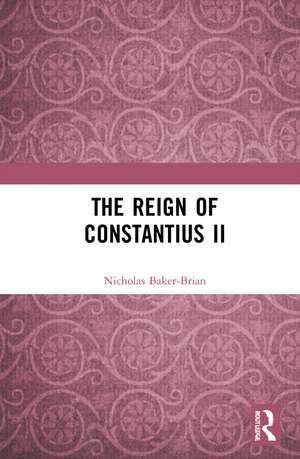The Reign of Constantius II
Autor Nicholas Baker-Brianen Limba Engleză Paperback – 29 ian 2024
This book examines the dynastic, political and cultural impact of Constantius' reign as a member of the Constantinian family on the later empire, first as a joint ruler with his brothers and then as sole Augustus. The chapters investigate the involvement of Constantius in the imperial, administrative, legal, religious and cultural life of the Roman Empire in the fourth century. Constantius’ handling of various threats to Roman hegemony such as the ambitions of the neighbouring Sasanian Empire, and his relationships with Gallus and with Julian are explored. The book’s analysis is guided by the epigraphic, iconographic, literary and legal evidence of the Roman and Byzantine periods but it is not a conventional imperial ‘biography’. Rather, it examines the figure of Constantius in light of the numerous historiographical issues surrounding his memorialisation in the historical and literary sources, for instance as ‘Arian’ tyrant or as internecine murderer. The over-arching aim is to investigate power in the post-Constantine period, and the way in which imperial and episcopal networks related to one another with the ambition of participating in the exercise of power.
The Reign of Constantius II will appeal to those interested in the Later Roman Empire, the Constantinian imperial family, Roman-Sasanian relations, and the role of religion in shaping imperial dynamics with Christianity.
| Toate formatele și edițiile | Preț | Express |
|---|---|---|
| Paperback (1) | 395.98 lei 6-8 săpt. | |
| Taylor & Francis – 29 ian 2024 | 395.98 lei 6-8 săpt. | |
| Hardback (1) | 1118.65 lei 6-8 săpt. | |
| Taylor & Francis – 15 iul 2022 | 1118.65 lei 6-8 săpt. |
Preț: 395.98 lei
Nou
Puncte Express: 594
Preț estimativ în valută:
75.77€ • 79.39$ • 62.64£
75.77€ • 79.39$ • 62.64£
Carte tipărită la comandă
Livrare economică 11-25 aprilie
Preluare comenzi: 021 569.72.76
Specificații
ISBN-13: 9781032010472
ISBN-10: 1032010479
Pagini: 436
Ilustrații: 20
Dimensiuni: 156 x 234 x 27 mm
Greutate: 0.61 kg
Ediția:1
Editura: Taylor & Francis
Colecția Routledge
Locul publicării:Oxford, United Kingdom
ISBN-10: 1032010479
Pagini: 436
Ilustrații: 20
Dimensiuni: 156 x 234 x 27 mm
Greutate: 0.61 kg
Ediția:1
Editura: Taylor & Francis
Colecția Routledge
Locul publicării:Oxford, United Kingdom
Cuprins
Chapter 1 Introduction: The Roman Empire of Constantine's Sons / Chapter 2 Seeing and Reading the Sons of Constantine / Chapter 3 Writing Constantius II / Chapter 4 Making and Shaping a Dynasty / Chapter 5 Upholding the Legacy: The Dynasty between 340–350 / Chapter 6 New Faces, Old Enemies / Chapter 7 Sole Augustus / Chapter 8 War and Little Peace: Constantius II’s Final Years / Chapter 9 Afterword: A Funeral and a Usurpation / Bibliography
Notă biografică
Nicholas Baker-Brian is Reader in Ancient Religions in the School of History, Archaeology and Religion at Cardiff University. He has published extensively on the late antique period, including most recently the co-edited volumes, A Companion to Religion in Late Antiquity (2018), The Sons of Constantine, AD 337–361 (2020) and Studia Patristica Vol. 102 (2021).
Descriere
This book examines the dynastic, political and cultural impact of Constantius' reign as a member of the Constantinian family on the later empire, first as a joint ruler with his brothers and then as sole Augustus.
